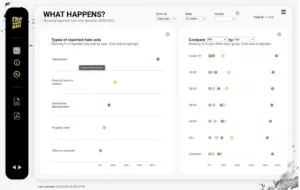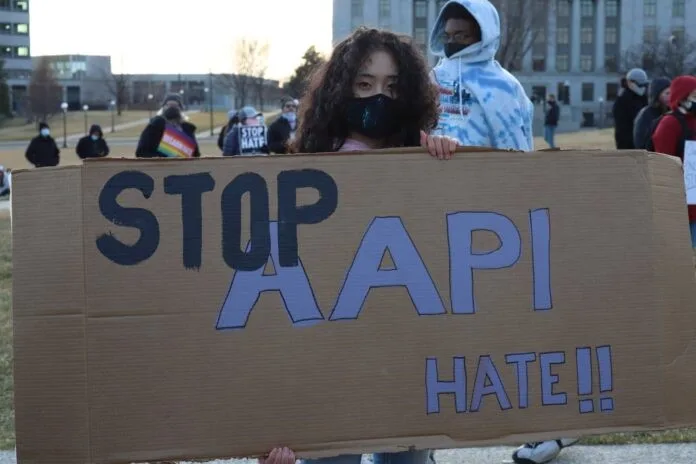Photo at a rally in 2021 by Adam Chau, AsAmNews
BY Akemi Tamasha, AsAmNews
New research suggests that institutions, not just individuals, can be the culprits of anti-Asian hate incidents.
Stop AAPI Hate, a nonprofit organization tracking self-reported incidents of hate and discrimination against Asian Americans and Pacific Islanders, recently released a new report examining the nuances of anti-Asian hate incidents. The report, Shades of Hate, was released in tandem with a new data visualization tool, allowing the public improved access to Stop AAPI’s data sets.
Researchers at Stop AAPI Hate analyzed 11,409 unique acts of hate reported to the organization between January 2020 and December 2022.
Shades of Hate provides a closer look at the types of hate Asian Americans have reported. While 51% of the reported hate acts involved explicit racial bias, another 29% involved perceived bias and 20% involved coded bias.
The study also shifted some of the focus away from individual offenders and onto societal issues. Researchers found that hate was not limited to interpersonal interactions but also “bred within a larger environment of societal hate.” Additionally, 15% of offenders worked for or represented an institution when the hate incident occurred.
“We wanted to understand offenders in a way that would actually lead us to solutions,” Dr. Stephanie Chan, Stop AAPI Hate director of data and research, said in an interview with AsAmnews.
For example, Dr. Chan noted that several incidents occurred at retail stores, where victims currently don’t have certain civil rights protections.
“By being able to see these places where Asian Americans and Pacific Islanders are experiencing institutional discrimination, it points us to places where we could strengthen, you know, civil rights protections,” Dr. Chan said.
In October, the FBI released hate crime data that indicated anti-Asian hate crimes were decreasing. Stop AAPI has warned that the FBI’s report does not paint a complete picture.
“We really cautioned policymakers and journalists like yourself from looking at one set of data, whether it’s law enforcement or an FBI, which relies on local law enforcement data, to suggest that hate is on the rise or decreasing,” Cynthia Choi, co-executive director of Stop AAPI said in an interview with AsAmNews.
Many Asian Americans still do not feel comfortable reporting their experiences to law enforcement. Others, Choi says, are experiencing “reporting fatigue,” believing nothing would be done even if they contacted law enforcement. Looking at other data sets is crucial.
Choi pointed out that one of the things that make Stop AAPI’s data “unique” is that it comes directly from Asian Americans who are choosing to report to the site.
“I think that there’s a tremendous amount of value in that, in the sense that we can hear directly or read directly what those experiences are and the nuance, and we’ve in some cases, we’ve been able to do follow up and get more information,” Choi said.
The reports are also not limited to only incidents that qualify as hate crimes.
“I think part of the reason why we also want to expand, you know, beyond talking about hate crimes is because people are thinking, Okay, I just experienced a really disturbing experience with verbal harassment. What am I supposed to do with this? Like, I don’t know if I’m supposed to report this. I don’t know where to report this,’” Dr. Chan said.
“And so one of our goals is to be able to help community members to identify what category this experience belongs in. And as a result, like, ‘Where can I go to seek help for what I’ve experienced.’”
Stop AAPI Hate is one of the leading research organizations in anti-Asian racism. Journalists, students and policymakers often reference their reports. The goal of their new data visualization tool is to make their research even more accessible.
“We’ve always wanted this data to be by communities and for our communities,” Chan said, adding, “We don’t want to be the gatekeeper. We want to be the gate opener.”
The public can use the dashboard to explore research on the different shades of hate. The tool also allows users to disaggregate the data by different variables including age, state, county and more.

Stop AAPI Hate’s data visualization tool.


